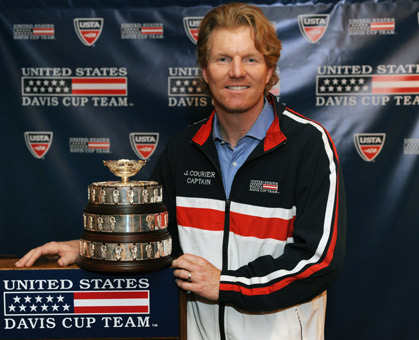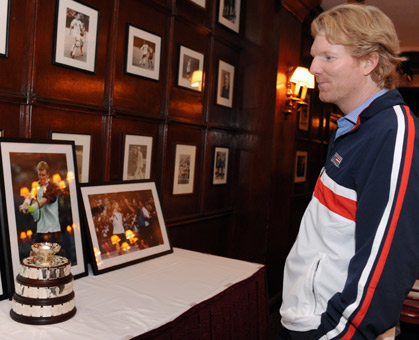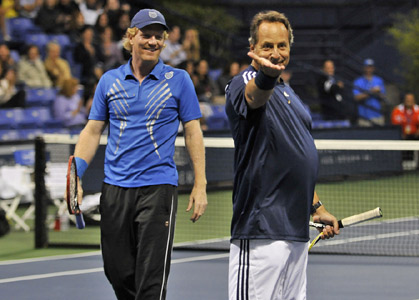
By Richard Pagliaro
© Jennifer Pottheiser/USTA
(October 28, 2010) Back in the days before bounty hunters, survival specialists and X-Games adrenaline junkies populated reality TV, tennis had its own hard-core, thrill-seeking
No. 1 who punished opponents with all the enthusiasm of a demolition expert taking down skyscrapers while peering out at the wreckage from beneath the brim of his baseball cap: Jim Courier.
The red-hair Floridian with the flame-thrower forehand, baseball swing backhand took fitness to new levels in capturing four Grand Slam championships and ascending to the World No. 1 ranking during a distinguished Hall of Fame career.
Courier contested the finals of all four Grand Slam tournaments, but above and beyond that he was a fascinating character with a curiosity for culture and passion for life. The 40-year-old Courier has crammed a lifetime of experiences along the way.
Famously diving into the polluted waters of the Yarra River after winning the Australian Open, he has learned to speak French, battled some of the game's greatest players on major stages and was one quarter of the American Davis Dream Team that included Andre Agassi, Pete Sampras and John McEnroe and won the 1992 Davis Cup championship, a feat watched from the cheap seats by a young kid named Andy Roddick.
Courier has played the drums on stage with REM, produced a tennis film, launched an event production company, InsideOut Sports & Entertainment, with longtime friend and former player Jon Venison, revived the senior tour in the United States, survived a golf cart crash and an actual round of golf with John McEnroe, served as a tennis television analyst and he recently got married.
All of those events prepared him for a new experience: his first job interview.
"I'd never interviewed for a job before," Courier confessed.
And so Courier picked up the phone a few weeks ago, dialed USTA headquarters in White Plains, N.Y. and began the interview for his dream job: U.S. Davis Cup captain.
Courier answered the call and the USTA responded in selecting the man who earned the nickname "The Rock" partly because of his Davis Cup prowess under pressure, to succeed Patrick McEnroe as the U.S. Davis Cup captain.
"My deepest congratulations to Jim Courier and the USTA for the inspired choice of making Jim Courier our Davis Cup captain," Agassi said. "Jim has the experience, integrity and focus needed to bring the US Davis Cup to new heights. I know first hand that a man with Jim's credentials as a warrior and a champion will bring out the best in our players and our fans. I wish you all the best as you take this historic step forward."

Nearly 10 years to the day after McEnroe was introduced as captain in a mid-town Manhattan press conference, he sat next to USTA President Lucy Garvin in the front table of an upstairs banquet room at Gallagher's Steakhouse in Manhattan to welcome Courier as his successor.
It probably won't be the last time the pair share the same space. Courier lives down the street from McEnroe in Greenwich Village, about 300 yards from InsideOut's headquarters, and vows to work with McEnroe, who remains at the USTA as General Manager of Player Development and his former coach, Jose Higueras, in helping foster the growth of American pros.
"It's a learning curve. It's a learning curve for (the team) and for me. I have the advantage of having Patrick's ear because Patrick lives down the street from me and Patrick has been in the trenches with them," Courier said. "There's a lot to be gleaned from Patrick and from (Davis Cup coach) Jay (Berger)."
Former World No. 1 Courier was selected from a notable group of candidates, including Brad Gilbert, former US Open finalist Todd Martin, MaliVai Washington, Michael Chang and Larry Stefanki.
Courier's serve-forehand based game is somewhat similar to Sam Querrey and John Isner, who are expected to serve as the cornerstones of the American squad in the coming years. Courier is friendly Mardy Fish, who accounted for all three points in the United States' World Group Playoff victory over host Colombia on the red clay of Bogota last month.
It was a heroic effort from Fish, who played 14 sets of tennis over a 72-hour period, including two five-set singles wins, to account for all three points for the USA. Fish was the first American man to account for all three points in a Davis Cup victory since Pete Sampras in the 1995 Davis Cup final in Moscow.
The USA will open the 2011 season with a new captain and yet another red clay road ahead. The Americans will take on host Chile in the March 4-6th first round that will likely be staged on red clay.
The United States owns a 4-0 record against Chile in the international team competition, including a 3-2 victory in the most recent tie between the nations in the 2006 Davis Cup quarterfinals on the grass of Mission Hills.
Four-time Grand Slam champion Courier delivered some of his most memorable and passionate performances in Davis Cup play. A capable closer, Courier posted a 5-1 record in clinching Davis Cup matches, including an American-best 3-0 mark in decisive fifth singles matches. Courier played on the 1992 and 1995 US Davis Cup championship squads. Courier compiled a 17-10 record in Davis Cup play and the United States was 13-1 in the 14 Davis Cup ties Courier played.

The two-time Australian Open and two-time French Open champion is the second former World No. 1 Hall of Famer to take over as Davis Cup captain in as many weeks following Patrick Rafter, who signed on as Australian Davis Cup captain last week.
"Jim will continue to bring class and character to the role of U.S. Davis Cup captain along with an outstanding pedigree in Davis Cup competition," USTA President Lucy Garvin said.
Courier's compact two-handed backhand recalls a baseball swing. He grew up firing fastballs to his father in the family yard in Dade City, Florida. An avid Cincinnati Reds fan, Courier once contemplated playing on the plastic turf of the old Riverfront Stadium when he wasn't dreaming of digging out shots on the dirt of Roland Garros. A percentage player even as a child, Courier said his junior tennis results prompted him to bypass his turn in the batter's box in favor of stalking the service box.
"The reason I didn't take the baseball route is because they don't have rankings for baseball players," Courier said. "I knew I was the second-best tennis player in the state of Florida and number eight in the United States of America when I was 12 years old and I couldn't tell you what I was in baseball, but I liked my chances in tennis of getting a scholarship to college. If they had rankings in baseball, maybe I would have been able to do the math and figure out my chances of being a professional baseball player versus a tennis player. But that was the decision-maker for me, I just thought I was better in tennis."
American tennis has been better off for his choice.
As a player, Courier brought a toughness, tenacity, physicality and strong will to the court — qualities he would like his team to exhibit though he's careful to point out he's not trying to create a collection of Courier clones, rather he wants to help the players bring out the best in themselves.
"I'm not looking at this that our players need to act the way I acted on court. Ultimately these players have their own personalities and strengths and I want them to play to those," Courier told Tennis Now at Wednesday's introduction ceremony. "My role is to not necessarily change what these guys are doing. It's to help them. And I think it will be more subtle than I'm
overt."
The good news for Courier is he believes America's top players are all passionate to support the Cup cause.
"Every one of them is dying to play. What a great thing for a captain to have. It wasn't always the case," Courier said.
Tennis Now caught up with Courier on Wednesday for this interview. Appropriately enough, Frank Sinatra's "My Way" was playing in the restaurant as Courier spoke about his Davis Cup ambition.
Tennis Now: Obviously, it's very early and you've just been named captain, but have you been in contact with any of the American players? What has their response been?
Jim Courier: I've spoken to everyone from Andy Roddick to Donald Young to Ryan Harrison to everyone in between I spoke to them during the process because I wanted to make sure if I was going to pursue this position that they would be comfortable with it so there is no incoming friction with the captain. That wasn't the case. Everyone was very supportive and comfortable with it. I spoke with them afterward to let them know that today would be the day we would announce it and how excited I am for the opportunity to work with them.
Tennis Now: In your speech, you noted this is an interesting time for the American Davis Cup team because you have the veteran players like Andy Roddick, Mardy Fish, the Bryan brothers and some enthusiastic younger players like Sam Querrey, John Isner and Ryan Harrison. When Patrick McEnroe took over as captain a decade ago he had a clear mission to create a young, cohesive team committed to the cause that would grow together. How do you view the team developing in your captaincy and are you going to try to create a core group relying on specific players as cornerstones or will it be more based on a tie-by-tie basis depending on the surface and opponent?
Jim Courier: I think it's going to be pretty organic. I think there will be a natural integration with the generations. You have to look at each tie and look at what your options are. Certainly having Andy Roddick commit to next year is a big bonus for the team. He's such a great leader and his record is terrific, obviously. He's done so well over the years and he's been so clutch. There's definitely going to be some integration and I hope to have a long tenure so I hope to stretch through and see younger guys coming through. But I wouldn't say I'm in a hurry to usher out the guys who have carried the team. I want those guys to be key components for sure and they deserve that right. They've earned that right.
I asked Andy if he would be comfortable with me saying (he will play in 2011) and he said "I'm not very coy. Either I'm in or I'm out and I'm in so say what you want to say."
Tennis Now: You were an intense player in any circumstance, but you really took the intensity to a high level in that 1999 Davis Cup tie when you beat Henman and Rusedski in five-set fights. Are great Davis Cup players born or made? Can the experience of playing Davis Cup bring out the intensity in a player or does the player have to bring that to Davis Cup?
Jim Courier: I think all of us are shaped by the choices we make. I'm not looking at this that our players need to act the way I acted on court. Ultimately these players have their own personalities and strengths and I want them to play to those. My role is to not necessarily change what these guys are doing. It's to help them. And I think it will be more subtle than overt.
Tennis Now: Are the players passionate about Davis Cup?
Jim Courier: Yes, Every one of them is dying to play. What a great thing for a captain to have. It wasn't always the case.
Tennis Now: Patrick did not bring the Bryan brothers to Bogota because of the high altitude he wanted four singles players. Have you thought about the kind of team you want to build?
Jim Courier: I'm thinking about it and the good news is I have time. I don't have to announce them team until we get a lot closer to it. I'm definitely thinking about what our options are but it would be too soon to tell. You need to make sure everyone is healthy first and foremost. Chile hasn't announced the city or surface yet so there are a lot of factors that are still in play.
My experience is a player is that I liked it more when the captain let all the players know as early as possible so you could plan accordingly. Because bviously scheduling is important so from a players' stand point you want to announce a team as soon as possible, but it's too early to tell right now.
Tennis Now: Can you talk about the interview process? Was it like a conventional interview where you go to White Plains, sit down and talk to the USTA execs like a regular job interview?
Jim Courier: It was a phone interview. Yeah, but I'd never interviewed for a job before.
Tennis Now: New experience for you.
Jim Courier: It's a new experience, yeah. I've been lucky enough to primarily work for myself over the years. I spoke to Jim Curley at the US Open as I think he did with many of the other candidates and spent some time talking about my interest level. And he explained to me what the process would be like and then there was one phone interview that I did with Patrick and Jim and Gordon Smith. They had a series of three days where I guess everyone phoned in (the USTA conducted interviews with all candidates over the phone).
Tennis Now: It's an inevitable question every captain is asked: what do you think about the Davis Cup format? Do you think it will ever evolve?
Jim Courier: It's my understanding, from a scheduling standpoint, that the format is locked in for the next four to five years. I know they have some commercial agreements so there's some structures in place to prevent it from changing from its current format for the time being. I think the Davis Cup has some untapped potential. It should be as prominent as the Grand Slams when it takes place. If you put it together with Fed Cup for an organized, nationalistic team competition taking place in a central location for two weeks, I think that would be beneficial from a fan interest stand point, from a media stand point and from a television stand point. I think you can have your cake and eat it too and still have the home and away aspect as a qualification aspect as they do in World Cup. You can still have that and not lose the integrity aspect of it. But that's a little pie-in-the sky. I don't work at the ITF and I don't know what their day-to-day reality is so it's unfair for me to speculate as to how easy that would be. I don't see it changing anytime soon in any case.
Tennis Now: What's Ryan Harrison's upside?
Jim Courier: Ryan is the best 18-year-old American I've seen since Roddick. I saw a lot in him in the matches he played at the US Open. That was an extremely positive experience. First and foremost, he's not afraid of the moment and that's special. He has a long run and a lot of hard work ahead of me. From everything I've heard about him and from the brief conversation I had with him the other day, he's very eager. He wants it. He's very hungry. He's got a pretty good plan in place to keep improving. You get a sense of the fire he brings to the table. I certainly relate to that. It's not the only way to get it done. Look a the rankings and there are various energies that get very positive results. I just love the fact in the big moment, Ryan wanted to be there and was comfortable in the situation. What he did against Ljubicic was impressive in oppressive conditions. In his next match, he was in great position to win that match. Didn't do it. If I had anywhere near that kind of command of myselt to speak the way he spoke to ESPN afterward, he really comported himself well. I would have been a basket case, but he was very composed and handled himself very well.
Tennis Now: You said different players are motivated in different ways. Do you know the players on this team well enough to know how to motivate them, pump them up or calm them down if necessary? Or is that something you can gain through the experience of practicing and leading the team?
Jim Courier: I know Andy, Mardy, James and the Bryan brothers so I know their personalites and what they're like. I don't know Sam and John as well. I'm just getting to know Ryan and Donald Young and other players who could play on the team. It's a learning curve. It's a learning curve for them and for me. I have the advantage of having Patrick's ear because Patrick lives down the street from me and Patrick has been in the trenches with them. There's a lot to be gleaned from Patrick and from Jay (Berger). My last Tour title was in Orlando with Todd Bridges when (the Bryan brothers) were like 15 years old.